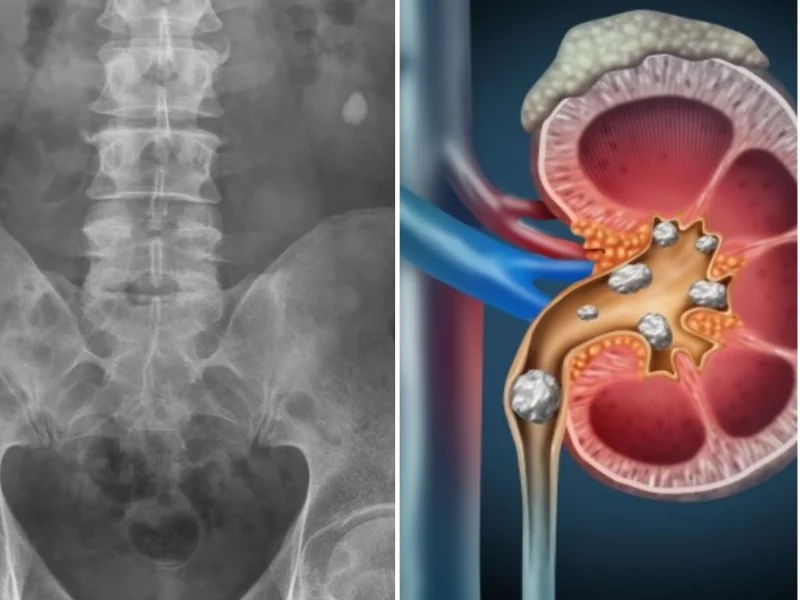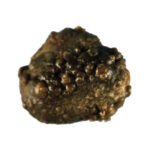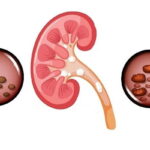Calcium phosphate renal calculi, commonly referred to as calcium phosphate kidney stones, are a subtype of nephrolithiasis primarily composed of calcium and phosphate ions. These stones often form in the renal system due to an imbalance in urinary pH, excessive calcium or phosphate excretion, or other metabolic abnormalities. Understanding the causes, symptoms, and treatment options is vital for effective management and prevention.

Causes and Risk Factors
Metabolic Imbalances
- Hypercalciuria: Excessive calcium excretion in urine, often linked to primary hyperparathyroidism or dietary factors.
- Hyperphosphaturia: Increased phosphate levels in urine, often associated with dietary phosphate or certain renal conditions.
- Renal Tubular Acidosis (RTA): Distal RTA promotes alkaline urine, favoring calcium phosphate crystallization.
Dietary Factors
- High sodium intake can increase calcium excretion.
- Low fluid intake concentrates urinary solutes.
- Diets rich in oxalate, protein, or phosphate may contribute to stone formation.
Genetic and Medical Conditions
- Inherited Disorders: Genetic predispositions such as Dent’s disease or cystinuria.
- Medical Conditions: Conditions like obesity, diabetes, and chronic kidney disease elevate risk.
Symptoms of Calcium Phosphate Renal Calculi
- Severe Flank Pain: Radiating to the groin as the stone migrates.
- Hematuria: Presence of blood in urine due to ureteral irritation.
- Dysuria: Pain or burning sensation during urination.
- Recurrent Urinary Tract Infections (UTIs): Stones serve as a nidus for bacterial growth.
- Nausea and Vomiting: Often accompanying acute episodes.
Diagnostic Approaches
Imaging Studies
- Non-Contrast CT Scan: Gold standard for detecting and sizing stones.
- Ultrasound: Useful for initial screening, especially in pregnant patients.
- X-Ray KUB (Kidneys, Ureter, Bladder): Can identify radiopaque calcium phosphate stones.
Laboratory Tests
- Urinalysis: Detects hematuria, pH abnormalities, and potential infection.
- 24-Hour Urine Collection: Measures calcium, phosphate, and oxalate excretion.
- Serum Tests: Evaluate calcium, phosphate, parathyroid hormone (PTH), and renal function.
Prevention Strategies
Dietary Modifications
- Increase Fluid Intake: Aim for at least 2.5 liters of urine output daily.
- Reduce Sodium: Low-sodium diets minimize calcium excretion.
- Balanced Calcium Intake: Avoid excessive calcium supplements but ensure adequate dietary calcium.
- Limit Animal Protein: Reduces acid load and subsequent calcium excretion.
Lifestyle Adjustments
- Maintain a healthy weight.
- Regular physical activity to reduce stone risk.
Medical Interventions
- Thiazide Diuretics: Decrease urinary calcium excretion.
- Potassium Citrate: Alkalinizes urine and reduces stone formation risk.
- Phosphaturia Control: Address underlying causes like RTA or hyperparathyroidism.
Treatment Options
Conservative Management
- Pain Relief: NSAIDs or opioids for acute episodes.
- Hydration: Promotes stone passage by increasing urine volume.
- Medical Expulsion Therapy (MET): Alpha-blockers like tamsulosin facilitate ureteral relaxation.
Surgical Interventions
- Extracorporeal Shock Wave Lithotripsy (ESWL): Non-invasive method to fragment stones.
- Ureteroscopy: Direct visualization and removal of stones using laser lithotripsy.
- Percutaneous Nephrolithotomy (PCNL): For large or complex stones.
- Open Surgery: Rarely required, reserved for complicated cases.
Prognosis and Long-Term Management
Calcium phosphate renal calculi have a high recurrence rate, necessitating long-term strategies for prevention. Regular follow-ups, adherence to dietary and medical recommendations, and monitoring metabolic parameters are crucial for minimizing recurrence risk.

